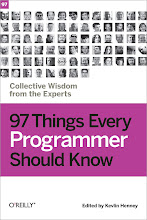
If you want the short version, here it is: Developers should get this book and spend some time absorbing the ideas in it. It’s well written and easy to read, but grokking it all will take time and practice. I recommend doing it as a team, book club style; read a bit then discuss it so you can bounce ideas off each other and get the benefit of other viewpoint. I also recommend starting now so you can write better code sooner!
Note to those who care: ‘Grok’ is a real word now, it’s in the Oxford English Dictionary, though I prefer the definition in Merriam Webster’s.
Still here? Well then, I think it’s safe to assume one or more of the following; you weren’t convinced by my four sentence review, you want more details about the book, or maybe you’ve just got some time to kill and like my writing style. Hey, stop laughing, it’s possible...
According to the authors, “Growing Object-Oriented Software, Guided by Tests” is the results of a couple of decades of experience, including almost ten years of Test-Driven Development (TDD) on a wide range of projects. While the authors state that the goal of the book is to teach you TDD, don’t believe them. From what I read, the goal is to teach you TDD the way it should be done. Just as having 100% code coverage doesn’t mean there are no bugs, writing unit tests first doesn’t guarantee a working system.
The authors expand upon the traditional approach to TDD by adding acceptance tests to the mix. Acceptance tests, sometimes called end-to-end tests, begin at the user level (UI or public API) and exercise all parts of the system to ensure the system performs correctly.
Their approach adds an outer loop to the standard Red-Green-Refactor
The book starts with a quick introduction to the authors’ view of TDD, the tools that will be used in the examples throughout the book (JUnit 4, the Hamcrest matching framework, and the jMock2 Framework).
In Part II, the authors go deeper into how they start a project using their acceptance test/unit tests approach. In it, they introduce the concept of a “walking skeleton” which forms the basic structure the rest of the system is built upon.
Part III, a “Worked Example” is the longest section of the book, and it’s where we get to look over the authors’ shoulders as they build a nontrivial application that includes a Swing-based user interface and third-party services in the back-end. Even so, it’s not a realistic application, which is good because at the level of detail they’re giving us, the book would be too big to lift.
One of the most important things this book does is prove that you can test-drive a functional user interface. Yes, it’s a Swing-base UI, but I suspect you could follow the same approach using Seleium or Geb and test-drive a web-based UI too.
Part IV is titled “Sustainable Test-Driven Development” and it the authors present some useful guidelines intended to help you keep your sanity while maintaining a test-driven approach.
Part V covers “Advanced Topics” like how to test persistence, dealing with mult-threading, and how to test asynchronous code.
There’s more after that, including “A Brief History of Mock Objects” and two useful Appendices.
I said it before, and I’ll say it again. Developers should get this book and spend time absorbing the ideas in it; preferably with other team members for the most benefit, Go solo if you must, the time invested will be well spent.
Disclosure: I received a free copy of the book from the publisher, with the understanding that I would read it and write a review of it. For more information read my Full Disclosure post.
Here's the publishing details:
Title: Growing Software , Guided by Tests
Authors: Steve Freeman and Nat Pryce
Published: 2009 by Addison-Wesley
ISBN-10: 0321503627
ISBN-13: 978-0321503626









